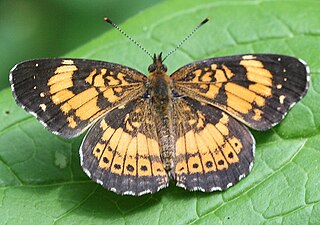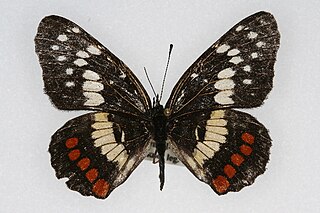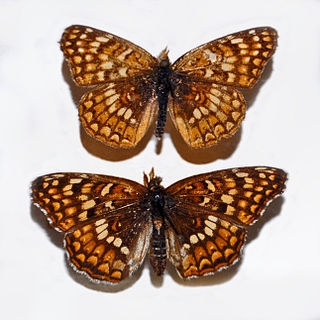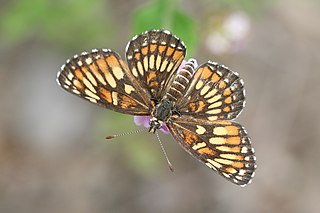
Chlosyne gorgone, the gorgone checkerspot, is a species of Nymphalinae butterfly that occurs in North America.

Chlosyne nycteis, the silvery checkerspot, is a species of Nymphalinae butterfly that occurs in North America. It is listed as a species of special concern in Connecticut and Maine, and is believed extirpated in Connecticut, Massachusetts, and New Hampshire.

Chlosyne is a genus of butterflies from North and South America in the family Nymphalidae.

Chlosyne harrisii, or Harris's checkerspot, is a member of the family Nymphalidae that is found in North America. They range from the Canadian Atlantic provinces, excluding Newfoundland and Labrador, to Manitoba and North Dakota south to West Virginia and Ohio. They can often be seen in bogs, meadows and almost anywhere else its host plant occurs. The typical elevations for this species range from 0 to 1,742 feet (531 m). It is listed as a species of special concern and believed extirpated in the US state of Connecticut.

Chlosyne acastus, the sagebrush checkerspot, is a butterfly of the family Nymphalidae that is found in North America. They range from western United States east to Nebraska and north to southern Alberta.

Chlosyne hoffmanni, or Hoffmann's checkerspot, is a butterfly of the family Nymphalidae that is found in western North America. They range from the Sierra Nevada and Cascade Mountains in the U.S. to Manning Park in British Columbia.

Chlosyne whitneyi, the rockslide checkerspot or Sierra Nevada checkerspot, is a butterfly of the family Nymphalidae. It is found in western North America from British Columbia and Alberta south, in the mountains, to California and Colorado.

Chlosyne ehrenbergii, the white-rayed checkerspot, white-rayed patch or Ehrenberg's patch, is a butterfly of the family Nymphalidae. It is found in Mexico.

Chlosyne marina, the red-spotted patch or marina checkerspot, is a butterfly of the family Nymphalidae. It is found in Mexico. Rare strays can be found as far north as southern Arizona and southern Texas.

Chlosyne fulvia, the Fulvia checkerspot, is a butterfly of the family Nymphalidae. It is found in North America from Kansas, Colorado, southern Utah and Arizona south to central Mexico.

Chlosyne gabbii, or Gabb's checkerspot, is a butterfly from the family Nymphalidae.

Chlosyne definita, known generally as the definite patch or definite checkerspot, is a species of checkerspot in the family Nymphalidae. It is found in North America.
Chlosyne endeis, known generally as the banded checkerspot or banded patch, is a species of crescents, checkerspots, anglewings, etc. in the butterfly family Nymphalidae. It is found in North America.

Chlosyne theona, the theona checkerspot, is a species checkerspots in the butterfly family Nymphalidae found in North America. The MONA or Hodges number for C. theona is 4508.












